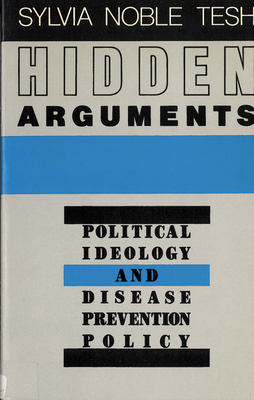Hidden Arguments: Political Ideology and Disease Prevention Policy

Hidden Arguments: Political Ideology and Disease Prevention Policy
In this provocative book, Sylvia Tesh shows how "politics masquerades as science" in the debates over the causes and prevention of disease. Tesh argues that ideas about the causes of disease which dominate policy at any given time or place are rarely determined by scientific criteria alone. The more critical factors are beliefs about how much government can control industry, who should take risks when scientists are uncertain, and whether the individual or society has the ultimate responsibility for health. Tesh argues that instead of lamenting the presence of this extra-scientific reasoning, it should be brought out of hiding and welcomed. She illustrates her position by analyzing five different theories of disease causality that have vied for dominance during the nineteenth and twentieth centuries, and discusses in detail the political implications of each theory. Tesh also devotes specific chapters to the multicausal theory of disease, to health education policy in Cuba, to the 1981 air traffic controller's strike, to the debate over Agent Orange, and to an analysis of science as a belief system. Along the way she makes these prinicipal points: She criticizes as politically conservative the idea that diseases result from a multifactorial web of causes. Placing responsibility for disease prevention on "society" is ideological, she argues. In connection with the air traffic controllers she questions whether it is in a union's best interests to claim that workers' jobs are stressful. She shows why there are no entirely neutral answers to questions about the toxicity of environmental pollutants. In a final chapter, Tesh urges scientists to incorporate egalitarian values into their search for the truth, rather than pretending science can be divorced from that political ideology.
PRP: 411.81 Lei
Acesta este Prețul Recomandat de Producător. Prețul de vânzare al produsului este afișat mai jos.
370.63Lei
370.63Lei
411.81 LeiLivrare in 2-4 saptamani
Descrierea produsului
In this provocative book, Sylvia Tesh shows how "politics masquerades as science" in the debates over the causes and prevention of disease. Tesh argues that ideas about the causes of disease which dominate policy at any given time or place are rarely determined by scientific criteria alone. The more critical factors are beliefs about how much government can control industry, who should take risks when scientists are uncertain, and whether the individual or society has the ultimate responsibility for health. Tesh argues that instead of lamenting the presence of this extra-scientific reasoning, it should be brought out of hiding and welcomed. She illustrates her position by analyzing five different theories of disease causality that have vied for dominance during the nineteenth and twentieth centuries, and discusses in detail the political implications of each theory. Tesh also devotes specific chapters to the multicausal theory of disease, to health education policy in Cuba, to the 1981 air traffic controller's strike, to the debate over Agent Orange, and to an analysis of science as a belief system. Along the way she makes these prinicipal points: She criticizes as politically conservative the idea that diseases result from a multifactorial web of causes. Placing responsibility for disease prevention on "society" is ideological, she argues. In connection with the air traffic controllers she questions whether it is in a union's best interests to claim that workers' jobs are stressful. She shows why there are no entirely neutral answers to questions about the toxicity of environmental pollutants. In a final chapter, Tesh urges scientists to incorporate egalitarian values into their search for the truth, rather than pretending science can be divorced from that political ideology.
Detaliile produsului











